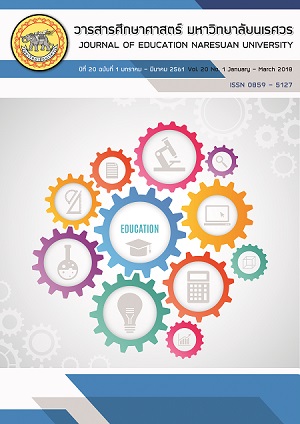งานวิจัยเชิงคุณภาพ: กระบวนทัศน์ที่แตกต่างและมโนทัศน์ที่คลาดเคลื่อน; QUALITATIVE RESEARCH: A DISTINGUISHED PARADIGM AND MISCONCEPTIONS
Main Article Content
Abstract
การดำเนินงานวิจัยทางการศึกษา ต้องอาศัยกระบวนทัศน์การวิจัยเป็นบรรทัดฐานในการศึกษา ค้นคว้า กระบวนทัศน์การวิจัยมี 2 กลุ่ม คือ กลุ่มปฏิฐานนิยม และกลุ่มกระบวนทัศน์ทางเลือก ทั้งสองกลุ่มมีความแตกต่างกันทั้งในเรื่องของมุมมองต่อความจริง มุมมองต่อความรู้ ระเบียบวิธีวิจัย เป้าหมายการวิจัย บทบาทของนักวิจัย กลุ่มตัวอย่าง ชนิดข้อมูล วิธีวิเคราะห์ข้อมูล และวิธีการเขียนรายงาน ภายใต้กระบวนทัศน์เหล่านี้ การดำเนินงานวิจัยจึงแบ่งได้เป็น 2 ลักษณะ ได้แก่ การทำวิจัยเชิงปริมาณ และการทำวิจัยเชิงคุณภาพ ในปัจจุบันการประยุกต์ใช้หลักการวิจัยเชิงคุณภาพ เพื่อการพัฒนาวิชาชีพครูกำลังได้รับความสนใจจากนานาประเทศ แต่ด้วยมโนทัศน์ที่คลาดเคลื่อนบางประเด็นที่ทำให้นักวิจัยเกิดความสับสนในการดำเนินการวิจัย ดังนั้น บทความนี้ จักได้นำเสนอกระบวนทัศน์ที่แตกต่างระหว่างวิจัยเชิงคุณภาพกับวิจัยเชิงปริมาณ และมโนทัศน์ที่คลาดเคลื่อน
QUALITATIVE RESEARCH: A DISTINGUISHED PARADIGM AND MISCONCEPTIONS
Conducting educational research is essentially concerned with a research paradigm, and there are mainly two paradigms including Positivism and Post-Positivism. These have held distinguish ideas about ontology, epistemology, methodology, goal, roles of researcher, sample, type of data, data analysis and report. Taking the paradigms into account, the educational research has been conducted on two types covered quantitative research and qualitative research. In present time, the qualitative research has been adapted for teacher professional development. Holding its misconceptions, however, brings researchers to be confused about how to operate the qualitative research. This article thus presents the research paradigms and principles of qualitative research and quantitative research based on the misconceptions.
Article Details
The owner of the article does not copy or violate any of its copyright. If any copyright infringement occurs or prosecution, in any case, the Editorial Board is not involved in all the rights to the owner of the article to be performed.
References
Bryman, A. (2001). Social Research Methods. New York: Oxford University Press.
Cholsin, J., Kijkuakul, S., & Chaiyasith, W. C. (2018). The action research for developing learning management on stoichiometry based on stem approach emphasized engineering design process to promote collaborative problem solving competency. Journal of Education Naresuan University, 20(2), (in press). (in Thai)
Cohen, L., Manion, L., & Morrison, K. (2000). Research Methods in Education (5th ed.). New York: The Taylor and Francis Groups.
Dash, N. K. (2005). Module: Selection of the Research Paradigm and Methodology. Retrieved February 27, 2017, from https://www.celt.mmu.ac.uk/researchmethods/Modules/Selection_of_methodology
Efron, S., & Ravid, R. (2013). Action Research in Education: A Practical Guide. NY.: The Guilford Press.
Golafshani, N. (2003). Understanding reliability and validity in qualitative research. The Qualitative Report, 8(4), 597-607. Retrieved January 6, 2016, from https://www.nova.edu/ssss/QR/QR8-4/golafshani.pdf
Goodnough, K. (2016). Professional learning of K-6 teachers in science through collaborative action research: an activity theory analysis. Journal of Science Teacher Education, 27, 747-767.
Harper, S. R., & Kuh, G. D. (2007). Myths and misconceptions about using qualitative methods in assessment. New Directions for Institutional Research, 136, 5-14.
Howe, C., & Stubbs, H. S. (1996). Empowering science teachers: A model for professional development. Journal of Science Teacher Education, 8(3), 167-182.
Jaipal, K., & Figg, C. (2011). Collaborative action research approaches promoting professional development for elementary school teachers. Educational Action Research, 19(1), 59-72.
Koutselini, M., & Patsalidou, F. (2015). Engaging school teachers and school principals in an action research in-service development as a means of pedagogical self-awareness. Educational Action Research, 23(2), 124-139.
Ladachart, L. (2012). Qualitative Research for Study of Students’ Understanding. Bangkok: Bureau of Academic Affairs and Educational Standards, Mistry of Education. (in Thai)
Litchtman, M. (2013). Qualitative research in education: A user’s guide (3rd ed.). LA: SAGE.
Mertler, C. (2014). Action research: Improving schools and empowering educators (4th ed.). LA.: SAGE.
Podhisita, C. (2009). Science and art of qualitative research (4th ed.). Bangkok: Amarin Printing & Publishing Public. (in Thai)
Polit, D. F., & Beck, C. T. (2010). Generalization in quantitative and qualitative research: Myths and strategies. International Journal of Nursing Studies, 47(11), 1451-1458.
Savin-Baden, M., & Major, C. (2013). Qualitative research: The essential guide to theory and practice. UK.: Routledge
Shenton, A. (2004). Strategies for ensuring trustworthiness in qualitative research projects. Education for Information, 22, 63-75.
Sutthinarakorn, W. (2014). Participatory action research and conscientization. Bangkok: Siam Piritus. (in Thai)
Taylor, S., & Bogdan, R. (1998). Introduction to Qualitative Research Methods: A Guidebook and Resource (3rd ed.). Canada: John Wiley & Sons.
Trna, J., & Trnova, E. (2015). The current paradigms of science education and their expected impact on curriculum. Procedia-Social and Behavioral Sciences, 197, 271-277.


